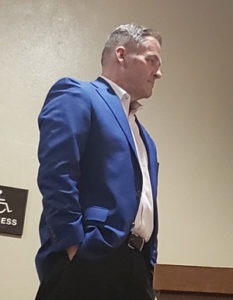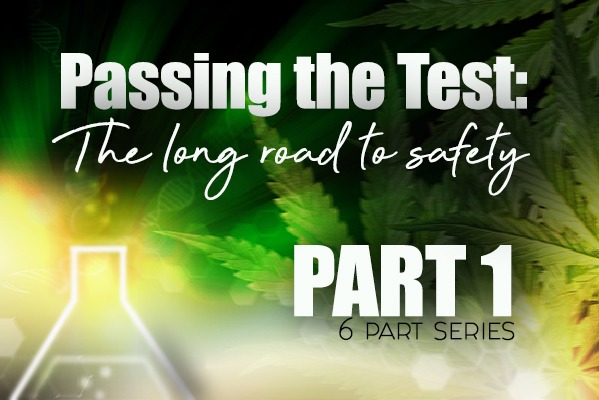BY MIKEL WEISSER
After years of struggle Arizona will finally have cannabis testing. Now what?
June 7, 2019, at approximately 2pm, supposedly Governor Doug Ducey made a quick call to Sen David Gowan (R-LD14). He thanked Gowan for his efforts at the Capitol and signed Gowan’s bill, SB1494, concluding a seven-year ordeal over testing in AZ’s medical marijuana industry.
Starting November 1, 2020, all cannabis products sold within the state’s medical marijuana program must be tested for health and safety issues, such as mold, mildew, pesticides and residual solvents in concentrates products. How SB1494 got passed has already been the topic of multiple articles here and elsewhere.
This round, Arizona Cannabis Monthly hopes to fill in some blanks, answer some questions, learn a bit about how Arizona ended up with SB1494 after years of stifled efforts, how cannabis testing works, who actually does the testing and what you need to know as a patient or as dispensary staff.
Long Road to Safety
“Pssst! Try smoking this. Don’t ask what’s in it, but it should be OK.”

Though mankind has supposedly been harvesting cannabis for more than ten thousand years records of using it medicinally go back four thousand years, and America included it in our pharmacopeia of medications well before the Civil War, by the time California created the country’s first medical marijuana program in 1996, cannabis had been federally illegal for nearly sixty years.
For decades cannabis consumers got what they got and that was that. Brick weed so dry it shattered, moldy oldy stuff that smelled like a leaky basement. Rampant pesticide-use and minimal sanitary standards were the norm on “Murder Mountain” when half of America was smoking Humboldt. The underground economy never seemed to care much about health and safety standards.
Stalling progress even further, the original California model was not a uniform statewide system, but a welter of conflicting city and county ordinances that still plague the Golden State. When Arizona finally succeeded in passing AMMA in 2010 it was only the 13th state to do so and the science of cannabis testing was still in its infancy.
Canna-haters like then-governor Jan Brewer and her AG Tom Horne were combing every possible angle they could think of to hobble the program. Fearing an insistence on testing regulations would delay the program, possibly indefinitely, then-DHS director Dr. Will Humble omitted it from the program.
Not Waiting for the Technology to Catch Up

“Given the state of technology at the time,” Humble explained in 2017, “We couldn’t delay the program to wait for the testing technology or the testing companies of the time to catch up. The expertise wasn’t here, and we might not have ever had those companies in Arizona for all we knew.”
In late 2014, once the program was comparatively secure, Humble put together a reform package for the program that included a recommendation to develop testing protocols. With Steve Cottrell’s AZ Med Testing now up and running, other industry leaders proposed testing provisions as part of a multi-part reform Humble was working on. Instead, incoming the governor, Ducey, was loathe to be associated with marijuana in any way. Instead, Ducey ordered a freeze on all agencies’ regulations. This meant the legislature was the only way to get testing regulations in place: By law.
Hemp Opens the Door

Progress remained delayed until 2017, when Sen Sonny Borrelli (R-LD5) took a 3rd swing at hemp reform. Knowing hemp would need to be tested for THC potency, Mikel Weisser with AZ-NORML, and Dr Hope Jones, then with C4 Labs, approached Borrelli to help the senator establish testing standards for industrial hemp. As a result, Borrelli agreed to sponsor a bill for medical cannabis testing the following session.
Starting that summer, Borrelli led the stakeholder process for a bipartisan MMJ reform bill that centered around cannabis testing. At first, Borrelli’s aptly numbered bill, SB1420, seemed to cause more problems than it solved. MITA-AZ, AZ-NORML and the ADA (Arizona Dispensary Association) squabbled both in private and in public over the shape of the regulations. Eventually, Borrelli’s bill battled its way to a final late-night floor, vote winning a majority of support. However, due to Prop105 Voter Protections, any vote aiming to amend a voter initiative requires 3/4s approval. Though that bill failed in the final hours of the 2018 session, the road forward was established.
Meanwhile as the testing technology did indeed improve, and more and more states launched their programs with cannabis testing built in, AZ’s program lagged farther and farther behind. By the end of 2018, it was clear that Arizona’s medical marijuana program was number one. As in the one and only state in the nation that did not test the medical marijuana sold to patients.
Dead Last
“Michigan, Rhode Island and Montana all came online last year, leaving Arizona as the sole state not protecting patient safety,” says Lezli Engelking, founder of FOCUS (Foundation of Cannabis Unified Standards)
After the painful defeat of SB1420, testing companies regrouped and decided to try a new approach. This round instead of relying on MITA or ADA lobbyists to shape their future industry, labs like C4 and the newly formed Level One Labs, created their own professional association, the Arizona Cannabis Labs Association (ACLA). As a group, the organization not only could a uniform organized front, but they could also afford to hire a lobbyist.
The organization picked, seasoned Capitol heavy-weight Brett Mechem, David Gowan’s former chief of staff when Gowan was the majority leader in the House, to shape the legislation and the campaign to “get the bill across the finish line.” The rest as they say is history.
Despite four different testing bills being filed this session (w yet a 5th bill that was prepped, but rejected by the Speaker of the House as overkill), and, Representative Dr Randy Friese (D-LD9) continuing with Borrelli’s stakeholder process on his own omnibus MMJ reform bill, there was little doubt, Gowan’s Sb1494, was the only bill with the oomph to get the job done.
Along the way, Mohit Asnani, owner of Tucson’s Downtown Dispensary and D2, hired one of the Capitol’s top lobbyists, Gibson McKay, to find a legislative fix for the ongoing concentrates crisis. McKay found LD21’s Tony Rivero to carry the bill known as HB2149. While it gained much attention through the legislative session, in the end that bill failed. In the process however, McKay was enlisted to assist with the behind the scenes lobbying lift. Despite breaking his hip mid-session, McKay not only taught himself to walk again, but stood with the lobbyists, who fine tuned the legislation up until the final afternoon of the session.

When the final vote was finally taken late in the night of the final day of the legislature, all the principal players were on-hand in the gallery, cheering together. After three years of steady effort, a testing bill was finally on its way to the governor. Exactly ten days later, Ducey agreed, cannabis testing was no longer just a good idea. From now on it would be the law.
Stay Tuned for Part 2: Basic Primer on Testing and Glossary of Incomprehensible Terms


